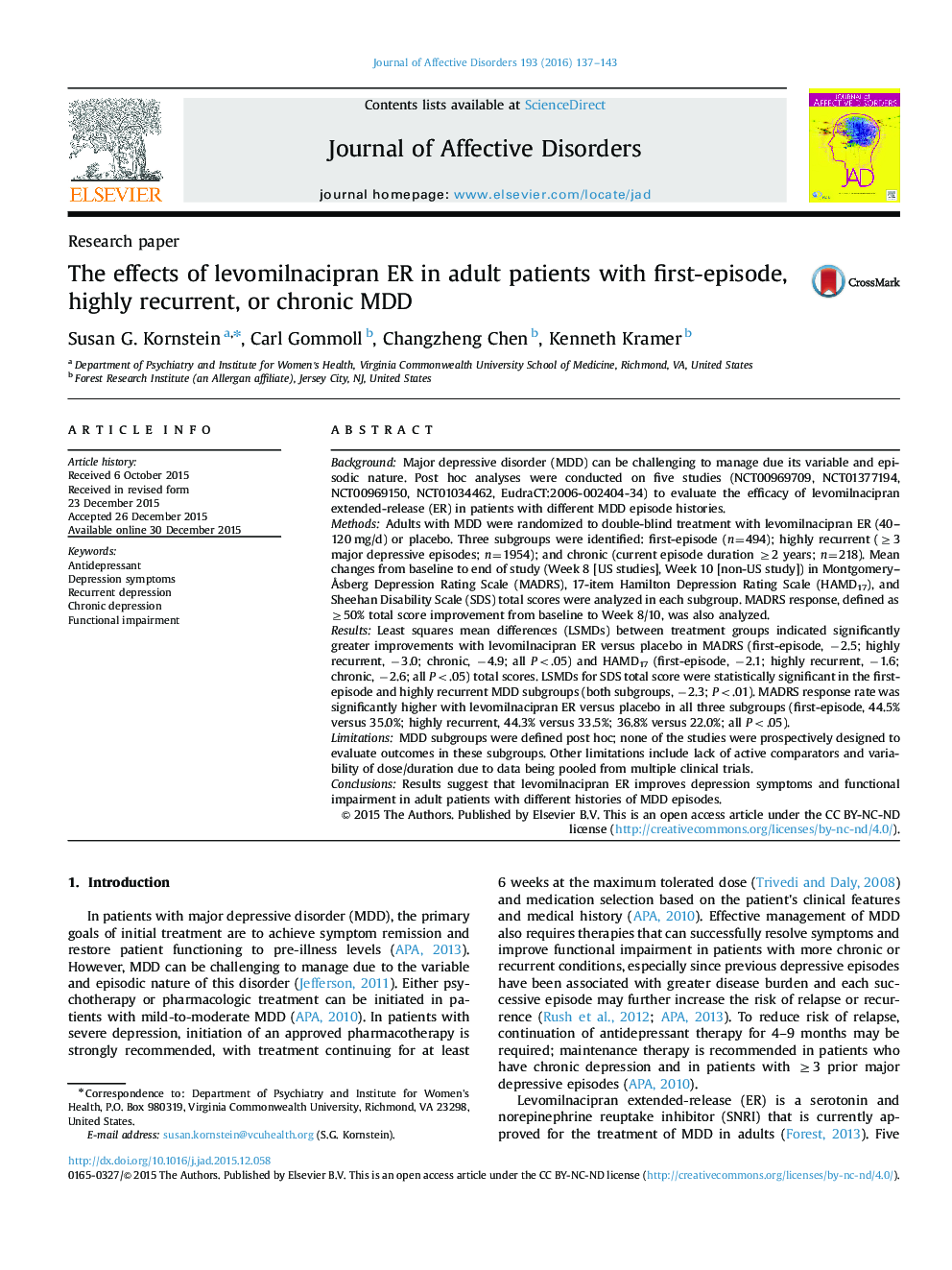| کد مقاله | کد نشریه | سال انتشار | مقاله انگلیسی | نسخه تمام متن |
|---|---|---|---|---|
| 6230445 | 1608132 | 2016 | 7 صفحه PDF | دانلود رایگان |

- Three subgroups (first-episode, highly recurrent, and chronic MDD) were identified.
- Levomilnacipran ER versus placebo was effective regardless of episode history.
- All 3 subgroups had significant depression symptom (MADRS, HAMD17) improvements.
- Response (MADRS, CGI-I) was significantly higher with levomilnacipran ER versus placebo.
- The largest effect on functional impairment (SDS) occurred in chronic MDD patients.
BackgroundMajor depressive disorder (MDD) can be challenging to manage due its variable and episodic nature. Post hoc analyses were conducted on five studies (NCT00969709, NCT01377194, NCT00969150, NCT01034462, EudraCT:2006-002404-34) to evaluate the efficacy of levomilnacipran extended-release (ER) in patients with different MDD episode histories.MethodsAdults with MDD were randomized to double-blind treatment with levomilnacipran ER (40-120 mg/d) or placebo. Three subgroups were identified: first-episode (n=494); highly recurrent (â¥3 major depressive episodes; n=1954); and chronic (current episode duration â¥2 years; n=218). Mean changes from baseline to end of study (Week 8 [US studies], Week 10 [non-US study]) in Montgomery-à sberg Depression Rating Scale (MADRS), 17-item Hamilton Depression Rating Scale (HAMD17), and Sheehan Disability Scale (SDS) total scores were analyzed in each subgroup. MADRS response, defined as â¥50% total score improvement from baseline to Week 8/10, was also analyzed.ResultsLeast squares mean differences (LSMDs) between treatment groups indicated significantly greater improvements with levomilnacipran ER versus placebo in MADRS (first-episode, â2.5; highly recurrent, â3.0; chronic, â4.9; all P<.05) and HAMD17 (first-episode, â2.1; highly recurrent, â1.6; chronic, â2.6; all P<.05) total scores. LSMDs for SDS total score were statistically significant in the first-episode and highly recurrent MDD subgroups (both subgroups, â2.3; P<.01). MADRS response rate was significantly higher with levomilnacipran ER versus placebo in all three subgroups (first-episode, 44.5% versus 35.0%; highly recurrent, 44.3% versus 33.5%; 36.8% versus 22.0%; all P<.05).LimitationsMDD subgroups were defined post hoc; none of the studies were prospectively designed to evaluate outcomes in these subgroups. Other limitations include lack of active comparators and variability of dose/duration due to data being pooled from multiple clinical trials.ConclusionsResults suggest that levomilnacipran ER improves depression symptoms and functional impairment in adult patients with different histories of MDD episodes.
Journal: Journal of Affective Disorders - Volume 193, 15 March 2016, Pages 137-143